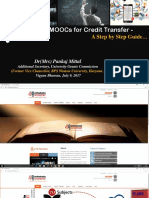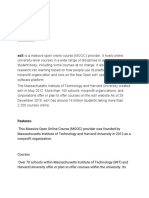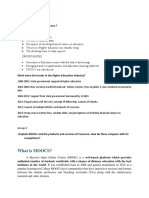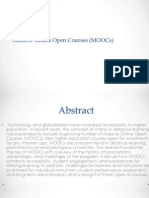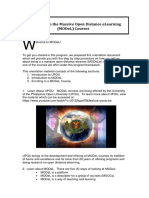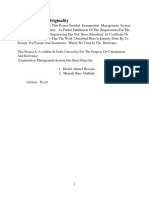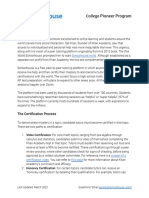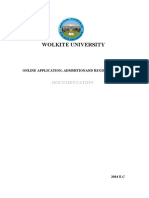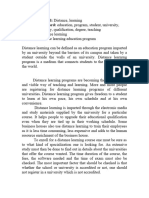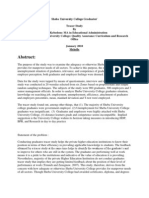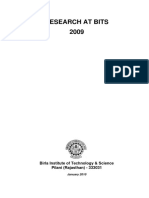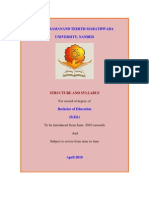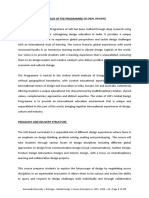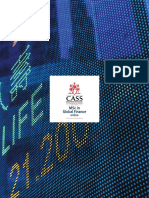Professional Documents
Culture Documents
Woolf Accreditation Brief
Woolf Accreditation Brief
Uploaded by
Kanika SingalOriginal Description:
Copyright
Available Formats
Share this document
Did you find this document useful?
Is this content inappropriate?
Report this DocumentCopyright:
Available Formats
Woolf Accreditation Brief
Woolf Accreditation Brief
Uploaded by
Kanika SingalCopyright:
Available Formats
Woolf
Online infrastructure for the future of higher education
Summary
Woolf is a technology company building infrastructure for the future of higher
education. We provide our member colleges with 'university as a service',
including accreditation, software systems, and other support benefits.
Colleges join Woolf as independent members within a shared framework for
quality assurance; they maintain the right to admit their own faculty and
students, set prices over their courses, and create new programs.
The accreditation problem
Accreditation is hard and complicated but it is central to success in the $2tn
higher education market. Most small colleges lack the time and staff to obtain
accreditation, and they lack the resources to maintain their accreditation on an
ongoing basis. At legacy universities, 50% of staff members are in
administration and compliance, but the new generation of digitally native
universities understand that there are better solutions. Woolf provides that
solution.
Woolf’s accreditation abilities
(1) Woolf is designed to support the membership of new college. We have
launched multiple colleges and their degree programs.
(2) The Woolf software system can ingest, benchmark, and accredit
educational content from diverse sources.
(3) Unique degrees can be created by stacking courses from multiple
organizations connected to Woolf because they all meet our software
standards
(3) The Woolf platform connects legacy education providers, including
brick-and-mortar universities, to our cloud marketplace; this unlocks
thousands of semi-digitized courses from their catalogue, and allows them to
increase their revenues by accessing global demand.
Benefits fo the Network
Most colleges join because they seek to offer accredited courses, and they are
happy to be given software tools.
Colleges then discover that there are benefits exclusively for members of the
collegiate network. These benefits include access to courses in subjects only
taught by other colleges, making it possible to stack courses into unique
outcomes; and access to Woolf's relationship with leading student recruitment
and content creation firms.
Colleges decide how much they want to participate in the wider collegiate
community. All colleges select their course visibility:
• Private: only visible internally to a college members
• Protected: only visible to the public under the providers URL
• Available: course can be added to another college’s degree pathway
• Public: course listed in the central, public, Woolf marketplace
Woolf’s current accreditation
Students accumulating credit points when studying at a Woolf college have
them converted to degrees through one of Woolf’s degree issuing subsidiaries.
For example, Woolf University operates Woolf Education, a licensed Higher
education Institution with the ability to provide degrees up to the PhD level
(European Qualifications Framework 8).
The European Credit Transfer System (ECTS) is the most widely-recognized
and sophisticated accreditation system in the world. Every major university,
including in the US, handles ECTS credits. ECTS are used natively across the
European Higher Education Area (EHEA) and by transfer to other countries.
Woolf’s future accreditation
All courses run through the Woolf system are benchmarked by the exact same
standards, regardless of the jurisdiction of degree issuance, or the educational
provider on the platform.
All accredited degrees should be issued by smallest number of legal entities
that can provide global coverage.
We intend to increase the number of owned or partner universities that can
accredit content. This will reduce friction for our education providers and
students, create resilience against regulatory changes, and foster a
competitive process for accreditation speed and cost.
You might also like
- Definition of MOOC - Loosely Defined As Online Courses Aimed at Large-Scale Interaction, Were SeenDocument6 pagesDefinition of MOOC - Loosely Defined As Online Courses Aimed at Large-Scale Interaction, Were SeenRajkumarNo ratings yet
- PHD - Brochure - 2024 Selinus University Bologna ItaliaDocument13 pagesPHD - Brochure - 2024 Selinus University Bologna Italiaari andriyantoNo ratings yet
- A List of 75 MOOCs For TeachersDocument13 pagesA List of 75 MOOCs For TeachersBilly James Arma RamosNo ratings yet
- Online LearningDocument11 pagesOnline Learningpriyamahesh0401No ratings yet
- Adopting Moocs For Credit Transfer - : A Step by Step GuideDocument15 pagesAdopting Moocs For Credit Transfer - : A Step by Step GuideppghoshinNo ratings yet
- Coursera AnalysisDocument20 pagesCoursera AnalysisKaran ChhabraNo ratings yet
- Analysis of Edx: CoursesDocument7 pagesAnalysis of Edx: CoursesAparna SinghNo ratings yet
- Circular Regarding Online-Open Distance Learning (ODL) SOP From 2023-24Document17 pagesCircular Regarding Online-Open Distance Learning (ODL) SOP From 2023-24abhishekarvindparmar1No ratings yet
- FA MOOCs Final July2015Document10 pagesFA MOOCs Final July2015Aland MediaNo ratings yet
- Coursera Answers - ExamDocument13 pagesCoursera Answers - ExamrachitaNo ratings yet
- PHD Brochure 2023 Ver 3Document13 pagesPHD Brochure 2023 Ver 3saimontawhid.redmiNo ratings yet
- Ontario - Institutional Vision, Proposed Mandate Statement and Priority Objectives - Centennial CollegeDocument33 pagesOntario - Institutional Vision, Proposed Mandate Statement and Priority Objectives - Centennial CollegeclimbrandonNo ratings yet
- Bed Pros xf16 MayDocument149 pagesBed Pros xf16 MayDevrajBhattacharjeeNo ratings yet
- What Are MoocsDocument9 pagesWhat Are MoocsMaryam MainahNo ratings yet
- Massive Online Open CoursesDocument18 pagesMassive Online Open CoursesBerzanNo ratings yet
- Orientation Material ModelDocument6 pagesOrientation Material ModelArvin DiamanteNo ratings yet
- CVRU-IODE Programme Guide (2018-19) - FACULTY OF SCIENCEDocument91 pagesCVRU-IODE Programme Guide (2018-19) - FACULTY OF SCIENCEsantosh suryawanshiNo ratings yet
- StudentVoice MemberGuide 20082009Document16 pagesStudentVoice MemberGuide 20082009duindaerNo ratings yet
- MSC ChemistryDocument82 pagesMSC ChemistryNisha NeonNo ratings yet
- BP For Online Programs Dec 2013Document12 pagesBP For Online Programs Dec 2013baluchiifNo ratings yet
- Student HandbookDocument20 pagesStudent HandbookdoanecastroNo ratings yet
- Live@Edu WhitepaperDocument11 pagesLive@Edu WhitepaperSermpong SangmaneeNo ratings yet
- Upgrad Woolf MBA BrochureDocument25 pagesUpgrad Woolf MBA Brochureshobhit.aroraNo ratings yet
- Cornell Distance LearningDocument21 pagesCornell Distance LearningTamaraJ.G.BarbosaNo ratings yet
- Master of Business Administration: by Upgrad School of Management and Technology, UkDocument24 pagesMaster of Business Administration: by Upgrad School of Management and Technology, Ukqn5dmk6sc5No ratings yet
- What Is Open and Distance LearningDocument4 pagesWhat Is Open and Distance LearningAmadou Conteh100% (1)
- Brochure PHD 2023 Ver 2Document11 pagesBrochure PHD 2023 Ver 2Thoraya SeadaNo ratings yet
- Learning at AlstomDocument19 pagesLearning at Alstomshashank_3110No ratings yet
- UC Berkeley Extension PresentationDocument14 pagesUC Berkeley Extension PresentationViktor KovalenkoNo ratings yet
- WGU BSIT ProgramsDocument21 pagesWGU BSIT ProgramsduhpandaNo ratings yet
- Guidelines For Local ChaptersDocument8 pagesGuidelines For Local ChaptersBalaji VenkataramanNo ratings yet
- Llerena Llerena Edx and MarshallDocument2 pagesLlerena Llerena Edx and MarshallKaty LlerenaNo ratings yet
- MIL Q4 W1 Current and Future Trends in Media and InformationDocument50 pagesMIL Q4 W1 Current and Future Trends in Media and InformationAlexis PortalNo ratings yet
- Uic CourseworkDocument7 pagesUic Courseworkafazapfjl100% (2)
- University of Mauritius Dissertation RulesDocument4 pagesUniversity of Mauritius Dissertation RulesWriteMyPaperForMeCheapCanada100% (1)
- BooksDocument11 pagesBooksmustafeNo ratings yet
- Week 3 Funding PaperDocument7 pagesWeek 3 Funding Paperapi-223837372No ratings yet
- McFord UniversityDocument23 pagesMcFord UniversityMcFordUniversity0% (1)
- OLWA University - Education To CareerDocument14 pagesOLWA University - Education To CareerOLWA UniversityNo ratings yet
- Envisioning A Roadmap For Embedding Online Modules and Courses in The Nsou EcosystemDocument4 pagesEnvisioning A Roadmap For Embedding Online Modules and Courses in The Nsou EcosystemSomeswar BhowmikNo ratings yet
- A Guide To Quality in Online LearningDocument28 pagesA Guide To Quality in Online LearningPedro MoralesNo ratings yet
- Massive Open Online Course (MOOC)Document7 pagesMassive Open Online Course (MOOC)Miko GarciaNo ratings yet
- WOU Student Handbook 2013Document154 pagesWOU Student Handbook 2013De Book100% (1)
- College Pioneer ProgramDocument3 pagesCollege Pioneer ProgramPlutarch HoltNo ratings yet
- POA Student Systems DeveloperDocument4 pagesPOA Student Systems DeveloperlovetodoNo ratings yet
- 1,2&3Document43 pages1,2&3biruk zerihunNo ratings yet
- University of Liverpool Online ProspectusDocument15 pagesUniversity of Liverpool Online ProspectusKaushik DebNo ratings yet
- 10 Reasons Amity Online Can Be Your Career's Biggest LeapDocument13 pages10 Reasons Amity Online Can Be Your Career's Biggest LeapAnubha PriyaNo ratings yet
- 3VOU Information Cum Admission Councellor ProposalDocument19 pages3VOU Information Cum Admission Councellor Proposalkim ko laNo ratings yet
- Covid 19 - Technology Support Committee: Working PaperDocument14 pagesCovid 19 - Technology Support Committee: Working Paper李师师No ratings yet
- Erb0924 1Document10 pagesErb0924 1api-250563897No ratings yet
- University of Derby ThesisDocument6 pagesUniversity of Derby Thesisbsh6df70100% (2)
- Aarush Systems Company ProfileDocument10 pagesAarush Systems Company ProfileDarpan Ashokrao SalunkheNo ratings yet
- MOOC Notes and ActivityDocument4 pagesMOOC Notes and ActivityyasukaellahNo ratings yet
- Mooc Course IntroductionDocument3 pagesMooc Course Introductionjijo123408No ratings yet
- SWAYAM - A Way of LearningDocument8 pagesSWAYAM - A Way of LearningKirti Dakshesh Thakar0% (1)
- Distance LearningDocument2 pagesDistance Learningbudi.j1127No ratings yet
- University of East London BrochureDocument16 pagesUniversity of East London BrochureOsama Sharaf100% (1)
- Assessment and Feedback in Higher Education: A Guide for TeachersFrom EverandAssessment and Feedback in Higher Education: A Guide for TeachersRating: 5 out of 5 stars5/5 (1)
- UCSI 2017 Student Handbook 2017Document65 pagesUCSI 2017 Student Handbook 2017SeanNo ratings yet
- TNOUDocument19 pagesTNOUanishkrishnannayarNo ratings yet
- International Application For Admission and Scholarship PacketDocument15 pagesInternational Application For Admission and Scholarship Packetrinchen mingchungNo ratings yet
- Sheba University College GraduatesDocument4 pagesSheba University College GraduatesHilario Domingo Chicano100% (2)
- G.K. Publications (P) Ltd. - GATE 2022 - Electronics and Communication Engineering - Guide-GK Publications Pvt. Ltd. (2021)Document847 pagesG.K. Publications (P) Ltd. - GATE 2022 - Electronics and Communication Engineering - Guide-GK Publications Pvt. Ltd. (2021)Lakshay Madaan100% (2)
- Help Master ProDocument14 pagesHelp Master ProSherry WongNo ratings yet
- 16062019-PG Bulletin2019-20 PDFDocument142 pages16062019-PG Bulletin2019-20 PDFPrabha JoshiNo ratings yet
- Syllabus Master's Programme in Computer ScienceDocument37 pagesSyllabus Master's Programme in Computer ScienceAbdelrahman SobhyNo ratings yet
- General Rules For Examinations Amended - 23 - 2 - 18 PDFDocument8 pagesGeneral Rules For Examinations Amended - 23 - 2 - 18 PDFSweeti ParmarNo ratings yet
- 234-Article Text-709-4-10-20210928Document22 pages234-Article Text-709-4-10-20210928lingatjoahna3No ratings yet
- Universities in USA Price ListDocument8 pagesUniversities in USA Price ListAshwin DuttaNo ratings yet
- Monash BrochureDocument68 pagesMonash BrochurePiyush ShuklaNo ratings yet
- Research at Bits 2009Document150 pagesResearch at Bits 2009Dr. Dinesh KatreNo ratings yet
- MSC Mechanical Engineering AppendixDocument10 pagesMSC Mechanical Engineering AppendixBirolC.YakupoğluNo ratings yet
- Gs 2009 GuideDocument32 pagesGs 2009 GuidengawuuNo ratings yet
- Prospectus of Paramedical College in Delhi - IPHIDocument16 pagesProspectus of Paramedical College in Delhi - IPHIParamedical CollegeinDelhiNo ratings yet
- Practice Test 70Document7 pagesPractice Test 70Võ Thành HiệpNo ratings yet
- B.ed. Revised Syllabus 2011-12Document68 pagesB.ed. Revised Syllabus 2011-12Mahesh BirajdarNo ratings yet
- GDP - Course DescriptorsDocument229 pagesGDP - Course DescriptorsMitali KapoorNo ratings yet
- FIT FashionDesign PortfolioDocument7 pagesFIT FashionDesign PortfolioUday KumarNo ratings yet
- PHD Regulation 2017Document24 pagesPHD Regulation 2017Anonymous rMhByXNo ratings yet
- Math HandbookDocument19 pagesMath HandbookRodrigo Fuentes AxtellNo ratings yet
- LKCDocument2 pagesLKCGlenden KhewNo ratings yet
- Undergraduate Bulletin 2011 12Document362 pagesUndergraduate Bulletin 2011 12arisuimasuNo ratings yet
- Philosophical Framework PDFDocument80 pagesPhilosophical Framework PDFEllen Jane Gonzales GulbenNo ratings yet
- Innovative Strategies For Teaching in The Plant SciencesDocument319 pagesInnovative Strategies For Teaching in The Plant SciencesdekaNo ratings yet
- Masters MSC in Global Finance: Full-Time Courses 2017 OnlineDocument4 pagesMasters MSC in Global Finance: Full-Time Courses 2017 OnlineKNO BUYNo ratings yet
- Royal Academy of Dramatic Art - ProspectoDocument24 pagesRoyal Academy of Dramatic Art - ProspectoYungaro David Santalla AquimNo ratings yet
- Qualification HandbookDocument132 pagesQualification HandbookAtif MahmoodNo ratings yet
- Topic 7: Further Education: (Grade 11-New Textbook)Document8 pagesTopic 7: Further Education: (Grade 11-New Textbook)gfjxf khpoaNo ratings yet




